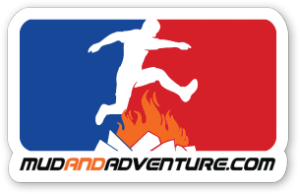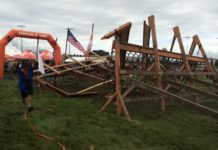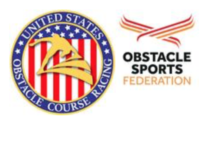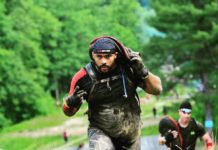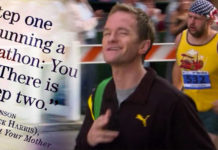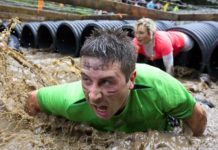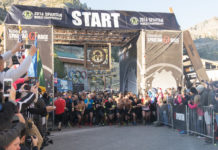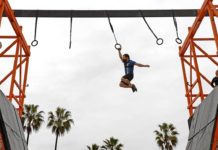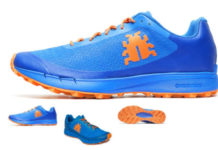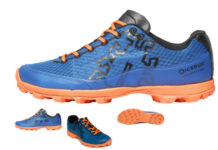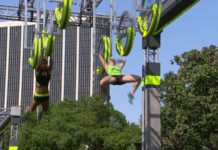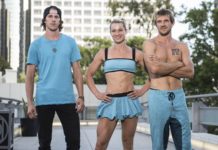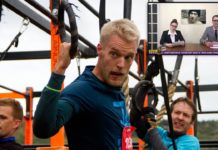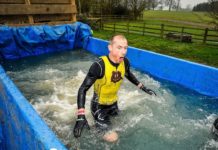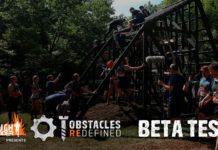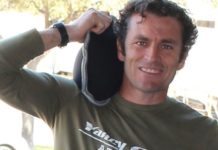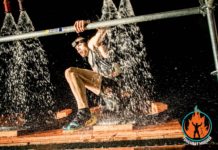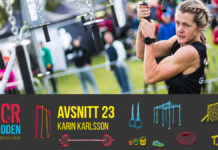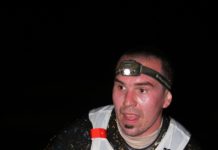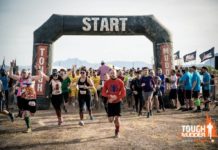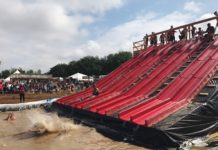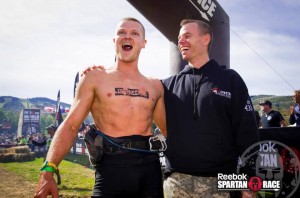
The recent Spartan World Championships in Killington Vermont (Beast and Ultra Beast) were a couple moderately difficult races. Ok, we jest, they were crazy tough (though fun), and put everyone through their paces. Whether you were a seasoned or elite obstacle racer. or an enthusiastic weekend warrior, these races had challenges to offer. Finishing top 10 in this highly competitive atmosphere was no small feat. Finishing 2nd for the Spartan Beast, in a time of 3:44:15 was Australia’s Matt Murphy. Here is his video recap of that race.
Matt has been burning up the courses in both the north and south hemispheres, winning Spartan obstacle races, and various other obstacle races. You can find some of Matt’s achievements listed here.
We were fortunate enough to get Matt on Skype for an interview recently. We’d heard from friends that Matt is a great guy, and this proved very true. He was a gracious interviewee, very humble, and happy to share some stories and a few laughs. He took us through some of his racing and training history, and provided some feedback on the sport and the recent Australian Beast and Ultra Beast races.
PK: Can you give us a little bit of your background

Matt Murphy: So background would be professional triathlete. I started triathlon when I was 13 or 14 and was pretty solid in it you know. Then I was recognized by a few national agencies like the Australian Institute of Sport and the New South Wales Institute of Sport. They said that if you learn to swim a little bit better, cause you know I lived it the country, so if I could swim a bit better you know I might be able to make a go of the sport so I moved to the beach and learned to swim and next thing I knew I was racing for my country at world championships and things like this so I was a professional triathlete from the age of 18 til 22. Traveled the world lived in America for a few years with Barb Lindquist to train with her for the Olympics.
Now she’s the head coach or the head scout for USAT/USA Triathlon. She went to the Olympics so I hung out with her for two years to help her get ready and then moved to Europe for another two years to race in the European League or the German League for Triathlon and then go some pretty serious injuries over there so I decided to come back and start a business as a personal trainer. I was 22 started a business and then the next five years of my life just pretty much disappeared.
But in saying that I got super strong while I was a personal trainer and I kept running a lot and then I found this thing called XTERRA in 2009, at the very start of 2009 and I thought that you know it’s swimming, it’s running, and it’s mountain biking and so I think I’d go alright so I trained pretty hard for nine months after that and went over to Maui for the World Championships and finished up 14th in the world for that. I was pretty happy with that and then work/life took back over I couldn’t really train for that any more because I was too busy and then I found obstacle racing.
Just before I started XTERRA I just sorta had a couple of races because I could run pretty fast and I was pretty strong it kinda went all right and then around 2012/2011 I started to train a bit more in the Obstacle specificity. Than I started winning all of them I guess apart from one. I think I haven’t won once and obviously world champs. And then went to world champs not really knowing what to expect and ended up getting second. So I guess you could say I was pretty happy about that. I had a pretty solid foundation of elite sport where I knew it was going to be a hilly course in Vermont and I knew that I had a good month plan of I have to get ready for a ton of hills so thats what I did. And then I got second so you could imagine I was pretty happy.
PK: I would imagine! So its funny that you talked with me briefly when we were just chatting you talked about it surprising you and despite all your training just taking you kind of by surprize. I think that is how you worded it more or less.
Matt: Ya there are such good guys out there. You got guys like Cody Moat he’s the national record holder for the 50 mile, he’s the US trail running champion. Matt Novakovich an amazing mountain runner and obviously Hobie Call who took who took out the day. There are so many awesome guys that are on the start line, guys who previously last year got top five. I knew that I had put in some really big work and they would have had to put in big work as well but still to pull of second….
PK: That was awesome!
Matt: It’s always nice to achieve a goal I guess you could say.
PK: With regards to Vermont, what do you think was the most difficult piece of that for you?
Matt: I think the biggest challenge was not going out too hard. And sorta hoping that [laughing] everyone else had gone out too hard and being patient, I guess you’d say over all the hardest thing would be being patient that I’d gone out at the correct pace, that I wouldn’t cramp, or I wouldn’t suffer to make sure I could make it through potentially five hours. Cause I had it in my head that I might have been out there for five hours so making sure that I had planned it out that that was my pace and things just fell in my direction I guess that I ate properly for the first three hours that I could pull it off that I came home quite strong where as a lot of the other guys really started to suffer. So for the first two or three hours, well two, two and a half hours its in the back of your mind just going well I can’t go any faster cause I probably won’t finish well I mean fifth, sixth which is not where I want to be but I need to get the lead on it because if I don’t get the lead on it I’m probably not going to finish.
PK: Right
Matt: So be patient was very very challenging.
PK: So in that regard you’ve done some big events and long events so to me that sounds a little more like strategy for an ultra for a 50 or 100 mile ultra where its be patient go out slow and you’re going to catch up to the people who go out too hard.
Matt: Ya, I think a lot of people don’t break world champs down enough you know, a regular running race is exactly like you said, it’s maybe 100 mile or 50 mile where if it’s pretty flat your muscle groups aren’t getting absolutely demolished where as in this there are so many hills that you’re loading big muscle groups a lot. It’s a lot like doing thousands and thousands of squats and the heavy tractor tire pulls and big big mountain run with a heavy sandbag your body is using so much energy to try to get up the hills rather than just a flat run where you are on the same plan using the same muscles over and over and over again whereas this every time you put your foot somewhere different, different muscles are having to switch over so your using so much more energy. I think if you put it on the cards like a one hour run versus a one hour world champs the energy expenditure would be far different, it’d be day and night in those two different events. To have a three hour forty five at Spartan Word Champs where it was so many muscle groups and big amount of load compared to a three or four hour run there’s day and night between the amount of energy expenditure and the toll that it takes on the body in such a short time.
PK: It made it more fun though. [laughing]
Matt: Ya its awesome man!
That concludes Part 1 of our interview with Matt Murphy. In Part 2, Matt talks about his experience in the recent Sydney Spartan Beast and Ultra Beast races.
